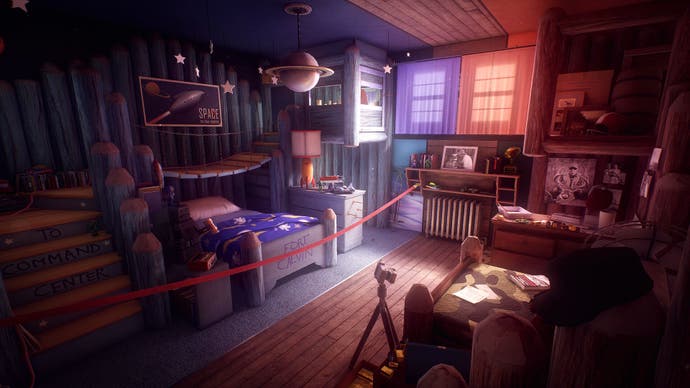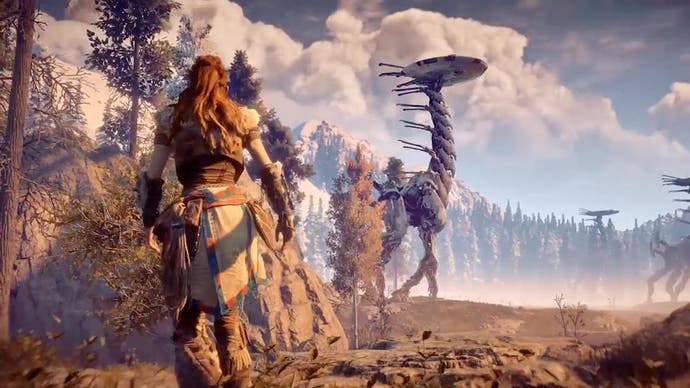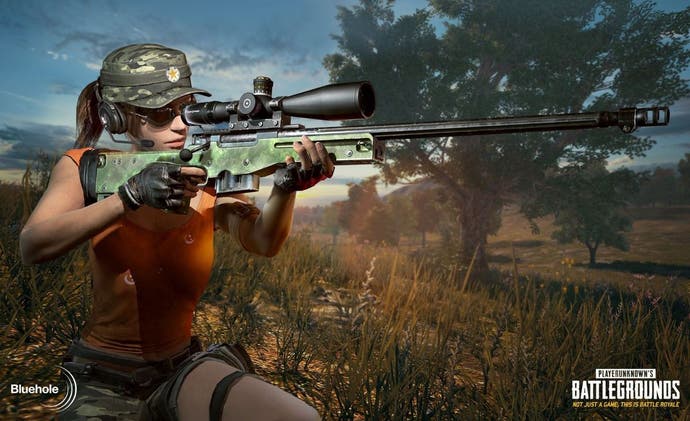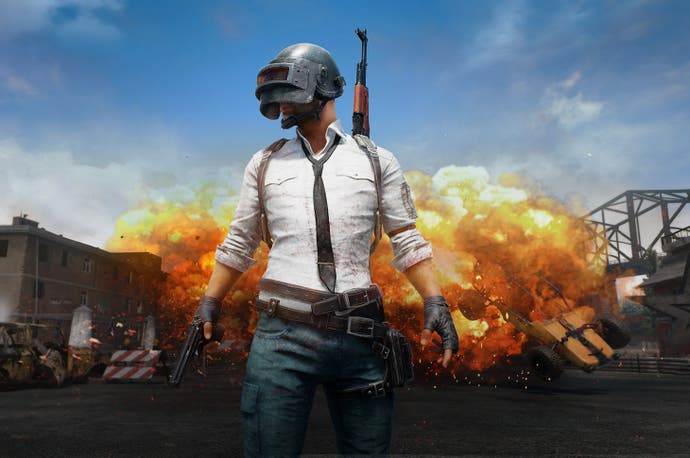The year in walking
Golf story.
I'm going to level with you: nobody knows who said 'golf is a good walk spoiled' so I'm going to ask that we all agree that Mark Twain probably said it. When Mark Twain probably said this, he made an astute distinction between experiential, ruminative, self-directed activity and rules-driven, scored, structured activity. Probably.
Or, to put it another way: most video games have a little bit of 'walk' in them and a tremendous amount of 'golf'. We tend to think and talk mostly about the golfness of a game: how much something costs and how much it offers, how fair it is and how it is won. This is important because there are a lot of video games and they would all like you to buy them, and the strengths and weaknesses of the structured experiences they provide are more or less the only thing you've got to go on when making a choice.
It's funny, though - the older I get, the less of a golfer I become. Short on time, I've become someone who tends to walk around for a bit in a game and then put it down. There are benefits to this: value propositions shift and frustration fades. I've become more conscious of the craft, rather than the business, of game creation, and more relaxed in my approach to games. I've enjoyed approaching games as places to wander, rather than as courses to complete.
Here's 2017 in walks, then.
From Resident Evil 7 to What Remains of Edith Finch
Resident Evil 7 is stripped-back and newly intimate, proudly bearing the influence of a modern wave of HUDless, sophisticated horror games. Despite its viciousness it shares space with games like Dear Esther and Gone Home that have had always had a relationship with disquiet - after all, either can be transformed into P.T simply by telling a new player "oh, I loved it - but the bit where you're ambushed by the murderer really got to me."
(For Firewatch, substitute 'yeti'. For Tacoma, 'the alien from Alien'.)

My time with Resi 7 ended as soon as it began to push back, to demand that I did more than meander from room to room, dreading each doorway. This is, I think, why What Remains of Edith Finch is so effective: it is challenging but not 'hard', which is a distinction games have traditionally struggled with. Like Resident Evil 7 it is a game about pushing doorways open and exploring an old, strange house, and like Resi it is genuinely unsettling at times. But it is also capable of silliness and subtlety, and this both takes the edge off its most tragic moments and, somehow, makes them worse.
I debated including Edith Finch because, despite being a game where you walk, it is fundamentally an experience that has been laid out for you: like Resi 7 it is closer to immersive theatre than a walk in the woods. But then I realised that it's near the top of the games I'd recommend this year because your time with it flows so naturally - it doesn't fight back or distract itself with doing anything other than telling this one story well. In that regard it has a peer in Hellblade, which I'll get to later on.
From Horizon to Breath of the Wild via Andromeda
The promise of an open world game is, fundamentally, that you can get distracted and the game will respond: the implicit punchline to "see that mountain, you can go there" is "even though your village desperately needs your help with something else." This is a challenge for Horizon. No other open world game this year can, I think, match its landscapes or offer a more compelling story or lead character. But there's a moment, six or so hours in, when the world opens up and every track and valley is revealed to lead to something - a hunting area, a treasure chest, a ruin.
There's a sense that the journey you're on is slightly different to the one being described to you: Aloy's quest is her own affair, but you-the-player are on a mission to rid the world of icons. It's a brilliant game regardless, and the gliding-crouching-running swiftness with which you move will make you wish that any real human being could run through bushes so elegantly (try it.) But Horizon exposed the weakness of telling players what they have left to do, rather than letting them decide.
For all the furore that surrounded its launch problems, Mass Effect: Andromeda was not a bad game. In places it was a very good game, a measurable evolution of BioWare's storytelling craft in service of a more grounded and character-driven take on Mass Effect. It was let down by Twitter-friendly glitches, the worst kind of glitches, and by a reworking of the first game's open-world element that was too busy with distractions.

Here's the thing: the purpose of walking or driving in a BioWare game is to pass the invisible boundaries where your companions, the characters you really care about, start to talk to one another. There are loads of these moments in Andromeda, and they are reliably great: good enough that you will stop the car whenever they start and wait, lest you pass into another pack of enemies or a new area or a sidequest. These are not unwelcome elements in and of themselves but they fight the thing that the game is actually about, and as such they speak to a lack of consideration of exactly what kind of experience the player was supposed to have - the anxiety of the triple-A dev tasked with providing something for everybody, despite being known for doing one specific thing well.
The game that got this right is, inevitably, Breath of the Wild - and Zelda is likely to occupy so many spots in 2017's year-end roundup that I almost don't want to dwell on it. I would put it this way: it succeeds because it approaches the open world like a box of unlabelled toys, rather than as the vast shopping list that the Ubisoft model traditionally presents. This is why it is so at home on the Switch: you can load it up anywhere and dive, run, ride into this world from any angle and find something to see or do. At no point does the game suggest that you've done the wrong thing, and it avoids itemising your achievements.
In fact beyond the steady upward tick of your health and stamina bars, and the acquisition of certain special powers and weapons, it's the rare exploratory game that encourages you to see most of your achievements as ephemeral. You hunt down ingredients to make meals and potions that you'll use exactly once. You'll go off hunting for a weapon for a specific task, knowing that it will eventually break. This is brave and brilliant, the opposite of the hoard-and-upgrade pattern common to these games, and it has the effect of making every short walk you take in Hyrule feel meaningful.
Across PlayerUnknown's Battlegrounds
Despite its vast popularity and the hardcore sheen that comes with online shooterdom, the appeal of Battlegrounds comes from the analogue and unforced nature of the encounters it provides. This is a game of doomed one-way hikes, a form of deadly orienteering that is ideally shared with friends because otherwise you don't have anybody to talk to in the one-to-thirty minutes it takes for a stranger to hunt you down.
Battlegrounds is an opportunity to hang out, even an excuse to do so when you need one. This is really the way it most resembles going for a walk, beyond the travel and the terrain. It's a few hours out with friends, with 'does anyone have a scope' standing in for 'can I have a bit of your water' and 'does anybody fancy a spicy trip to the prison' standing in for 'does anybody fancy a pint after.'

Battlegrounds' phenomenal success is not owed to the way it looks or, to be honest, the precise way it plays: it didn't blast past CS:GO on the Steam charts by having stronger shooter fundamentals. Battlegrounds is popular because it provides just enough stimulation to spur a social experience but not so much that it becomes impossible to be social. People want to hang out while they do something and do something while they hang out, and it's remarkable in hindsight that games are so bad at providing this: it's more commonly territory filled by board games, escape rooms, going for walks, or, indeed - at risk of annoying Mark Twain - golf.
Do you know what spoils a good walk, Mark? Being shot.
Through Hellblade
Hellblade is remarkable and these winter months are the time to play it if you didn't back in August. It makes the case, compellingly, that there is a middle ground between gaming's traditional areas of interest and the developing craft of immersive storytelling. Or to put it another way: it is an action game made with the attention to detail, maturity and artistic integrity of a Dear Esther or an Edith Finch, hard-going but necessary because it exposes how rarely games of this kind interrogate the effectiveness of their own methods. You feel every sword stroke in Hellblade because a self-critical and multidisciplinary effort has been engaged to make you feel it.
Hellblade is a breakdown experienced as a kind of wandering violent fugue, fundamentally a game about the way that perception and mood changes as you transition from one place to the next. It has something of Bloodborne's ruminative uncertainty but presented with the intensity of a one-person play. Unlike every other game in this list it is is an unhappy journey, unwillingly embarked on - a genuine nocturne in a medium where night is traditionally just a bluer sort of day.
It seems fitting that the attention it drew on launch was so focused on its threat to delete your progress if you failed too much: with that one arguably unsubtle gesture Hellblade found itself dragged into the realm of consumer rights, the territory beyond the provisions granted to art where the golf referees live. The resultant, patient explanation - that this game full of theatre had done a bit of theatre - was vicariously embarrassing.
From Destiny 2 to Battlefront 2
There is a controversy-deflating aspect to approaching games as short walks that can be healthy from time to time. That is not to advise that you ignore the problems that games have - it is right to criticise the profiteering of a game like Battlefront 2 when it already comes priced at a premium, and it is appropriate to consider the way that the availability of a loot box system has caused problems for Destiny 2's latter hours. But unless your mind, outlet or YouTube channel feeds primarily on anger then there is a limit to how long this can last. Don't get me wrong: I suspect that the internet is capable of infinite outrage. But we are not.
Some of my favourite bits of video game walking this year have taken place in these two, widely censured games. They are each best played with the take-it-all-in attitude of an E3 demo video, the gently-tilted analogue sticks of somebody who is in it for the ride. You get a lot more out of the experience at this pace: the turbulent numberwang that makes everybody angry only kicks in when you click that stick forward to the sprint position.
Bungie have a peerless ability to turn sci-fi concept art into a place you can walk around, a process analogous to the progress of Star Wars from Ralph McQuarrie's drawing board to Elstree Studios to the desks of developers at DICE whose job it was to hide an extraordinary rendition of that beloved universe behind a PR catastrophe. It's all still there if you go looking for it: what I am arguing, I suppose, is that the walk - the good bit - can, in the right conditions, be rescued from the golf.

